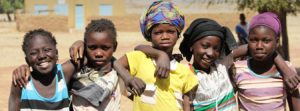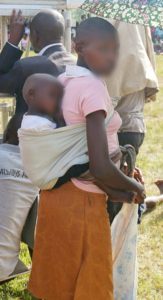International Day of the Girl Child: In 2011, the UN declared October 11 as the International Day of the Girl Child to recognize girls’ rights and to highlight the challenges that girls face around the world.
Every year, the International Day of the Girl Child aims to highlight and address the needs and challenges girls face, while promoting girls’ empowerment and the fulfilment of their human rights.
Around the World, girls still face huge barriers to accessing education and work, and have very little influence over their own futures.
In his message to mark the international Day of the girl Child, the United Nations Secretary General Antonio Guterres said Women and girls can lead us to a fairer future.
“Let us amplify girls’ voices, and recommit to working together to build a world where every girl can lead and thrive. Give girls an opportunity to lead by putting them in the forefront of change efforts; hearing their voices; responding to their asks; and welcoming them in decision-making spaces – it is one of the ways to invest in a future that believes in girls’ agency,” Guterres said
He adds, “This year, at a time when we are seeing a range of movements and actions to curtail girls’ and women’s rights and roll back progress on gender equality, we see particularly harsh impacts on girls. From maternal health care and parenting support for adolescent mothers, to digital and life skills training; from comprehensive sexuality education to survivor support services and violence prevention programmes; there is an urgent need for increased attention and resourcing for the key areas that enable girls to realize their rights and achieve their full potential.”

“Responding to girls’ calls for change, the global community must move beyond reaffirming commitments and invest boldly in the action needed to make that change. When we pay attention, we see that, already, many girls are championing solutions and change in their communities. Together with our government and civil society partners, UNICEF envisions a world where girls have space to shape government policy and spending to inform the rules and norms by which businesses should operate, and to direct the priorities for new research and innovations. These examples should not be novelties, but the norm.” the statement reads
The 2023 theme; Invest in Girls’ Rights: Our Leadership, Our Well-being, aims to unite adolescent girls with advocates for their rights, including UN leaders, NGOs, businesses, and governments.
According to Faraja Africa Foundation, celebrating the resilience, strength, and dreams of girls worldwide helps to keep working towards a world where every girl’s voice is heard and her opportunities are boundless.
“At Faraja Africa Foundation, we are proud to champion the potential and power of girls through our programs like SELFEmployUG , YouthParliamentUG and YouthInPolicyUG. Today, and every day, we stand strong in our commitment to empowering girls, breaking down barriers, and promoting gender equality.” their October 11th tweet reads

International Statistics
- Nearly 1 in 5 girls are still not completing lower-secondary and nearly 4 in 10 girls are not completing upper-secondary school today.
- Around 90 per cent of adolescent girls and young women do not use the internet in low-income countries, while their male peers are twice as likely to be online.
- Globally, girls aged 5-14 spend 160 million more hours every day on unpaid care and domestic work than boys of the same age.
- Adolescent girls continue to account for 3 in 4 new HIV infections among adolescents.
- Nearly 1 in 4 married/partnered adolescent girls aged 15-19 have experienced physical or sexual violence from an intimate partner at least once in their lifetime.
- Even before the COVID-19 pandemic, 100 million girls were at risk of child marriage in the next decade. And now over the next ten years, up to 10 million more girls worldwide will be at risk of marrying as children because of the COVID-19 pandemic.
According to Community Transformation FoundationNetwork-COTFONE, In Ssese Islands-Kalangala, 365 were defiled in 2022. In 2023, 208 cases reported, so far. 14% of girls aged 15 to 17 years old become pregnant due to defilement. General Police report 2022- 12,780 children were defiled.

Background
In 1995 at the World Conference on Women in Beijing countries unanimously adopted the Beijing Declaration and Platform for Action – the most progressive blueprint ever for advancing the rights of not only women but girls. The Beijing Declaration is the first to specifically call out girls’ rights.
On December 19, 2011, United Nations General Assembly adopted Resolution 66/170 to declare October 11 as the International Day of the Girl Child, to recognize girls’ rights and the unique challenges girls face around the world.
The International Day of the Girl Child focuses attention on the need to address the challenges girls face and to promote girls’ empowerment and the fulfilment of their human rights.
Adolescent girls have the right to a safe, educated, and healthy life, not only during these critical formative years, but also as they mature into women. If effectively supported during the adolescent years, girls have the potential to change the world – both as the empowered girls of today and as tomorrow’s workers, mothers, entrepreneurs, mentors, household heads, and political leaders. An investment in realising the power of adolescent girls upholds their rights today and promises a more equitable and prosperous future, one in which half of humanity is an equal partner in solving the problems of climate change, political conflict, economic growth, disease prevention, and global sustainability.
Girls are breaking boundaries and barriers posed by stereotypes and exclusion, including those directed at children with disabilities and those living in marginalized communities. As entrepreneurs, innovators and initiators of global movements, girls are creating a world that is relevant for them and future generations.
The 2030 Agenda for Sustainable Development and its 17 Sustainable Development Goals (SDGs) adopted by world leaders in 2015, embody a roadmap for progress that is sustainable and leaves no one behind.
Achieving gender equality and women’s empowerment is integral to each of the 17 goals. Only by ensuring the rights of women and girls across all the goals will we get to justice and inclusion, economies that work for all, and sustaining our shared environment now and for future generations.
Do you have a story in your community or an opinion to share with us: Email us at centralupdates31@gmail.com or stmaurice35@gmail.com or call and WhatsApp us on 0758 931705





